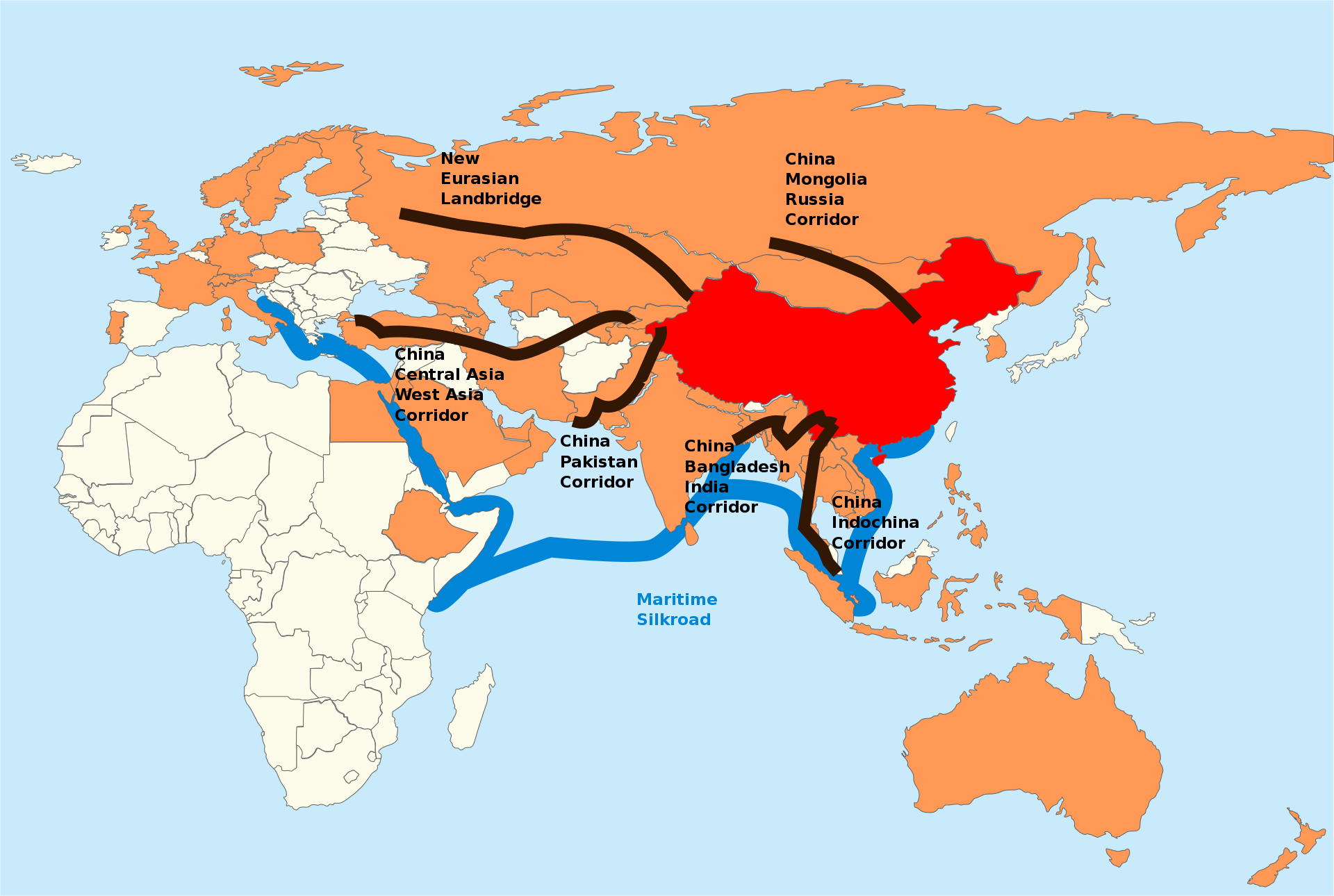More languages
More actions
Spookfessor (talk | contribs) mNo edit summary Tag: Visual edit |
m (Added message box for cleaning up) |
||
| Line 1: | Line 1: | ||
{{External article cleanup|date=November 2021}} | |||
[[File:One-belt-one-road.svg.png|alt=Map of Transportation routes in the Belt and Road Initiative|thumb|Transportation routes in the Belt and Road Initiative]] | [[File:One-belt-one-road.svg.png|alt=Map of Transportation routes in the Belt and Road Initiative|thumb|Transportation routes in the Belt and Road Initiative]] | ||
The '''Belt and Road Initiative''' ('''BRI''', or '''B&R'''), known in Chinese and formerly in English as '''One Belt One Road''' or '''OBOR''' for short, is a global infrastructure development strategy adopted by the [[China#Governance|Chinese government]] in 2013 to invest in nearly 70 countries and international organizations. It is considered a centerpiece of [[Communist Party of China]] general secretary and paramount leader [[Xi Jinping]]'s [[Foreign policy of Xi Jinping|foreign policy]].<ref>{{Cite news|title=President Xi proposes Silk Road economic belt|url=https://www.chinadaily.com.cn/china/2013xivisitcenterasia/2013-09/07/content_16951811.htm|work=China Daily|agency=Xinhua News Agency|location=Astana|date=7 September 2013|archive-url=https://web.archive.org/web/20200309024641/https://www.chinadaily.com.cn/china/2013xivisitcenterasia/2013-09/07/content_16951811.htm|archive-date=9 March 2020|url-status=live}}</ref><ref>{{Cite web|title=President Xi Jinping Delivers Important Speech and Proposes to Build a Silk Road Economic Belt with Central Asian Countries|url=https://www.fmprc.gov.cn/mfa_eng/topics_665678/xjpfwzysiesgjtfhshzzfh_665686/t1076334.shtml|archive-url=https://web.archive.org/web/20201017031834/https://www.fmprc.gov.cn/mfa_eng/topics_665678/xjpfwzysiesgjtfhshzzfh_665686/t1076334.shtml|archive-date=17 October 2020|url-status=live|date=7 September 2013|website=Ministry of Foreign Affairs of the People's Republic of China}}</ref> | The '''Belt and Road Initiative''' ('''BRI''', or '''B&R'''), known in Chinese and formerly in English as '''One Belt One Road''' or '''OBOR''' for short, is a global infrastructure development strategy adopted by the [[China#Governance|Chinese government]] in 2013 to invest in nearly 70 countries and international organizations. It is considered a centerpiece of [[Communist Party of China]] general secretary and paramount leader [[Xi Jinping]]'s [[Foreign policy of Xi Jinping|foreign policy]].<ref>{{Cite news|title=President Xi proposes Silk Road economic belt|url=https://www.chinadaily.com.cn/china/2013xivisitcenterasia/2013-09/07/content_16951811.htm|work=China Daily|agency=Xinhua News Agency|location=Astana|date=7 September 2013|archive-url=https://web.archive.org/web/20200309024641/https://www.chinadaily.com.cn/china/2013xivisitcenterasia/2013-09/07/content_16951811.htm|archive-date=9 March 2020|url-status=live}}</ref><ref>{{Cite web|title=President Xi Jinping Delivers Important Speech and Proposes to Build a Silk Road Economic Belt with Central Asian Countries|url=https://www.fmprc.gov.cn/mfa_eng/topics_665678/xjpfwzysiesgjtfhshzzfh_665686/t1076334.shtml|archive-url=https://web.archive.org/web/20201017031834/https://www.fmprc.gov.cn/mfa_eng/topics_665678/xjpfwzysiesgjtfhshzzfh_665686/t1076334.shtml|archive-date=17 October 2020|url-status=live|date=7 September 2013|website=Ministry of Foreign Affairs of the People's Republic of China}}</ref> | ||
Revision as of 18:37, 14 November 2021
 | Some parts of this article were copied from external sources and may contain errors or lack of appropriate formatting. You can help improve this article by editing it and cleaning it up. (November 2021) |

The Belt and Road Initiative (BRI, or B&R), known in Chinese and formerly in English as One Belt One Road or OBOR for short, is a global infrastructure development strategy adopted by the Chinese government in 2013 to invest in nearly 70 countries and international organizations. It is considered a centerpiece of Communist Party of China general secretary and paramount leader Xi Jinping's foreign policy.[1][2]
The BRI is one of the many factors which is leading to de-dollarization, the transition away from the dependence on the US dollar as a global reserve asset and means of exchange.[3]
The project has a target completion date of 2049.[4]
